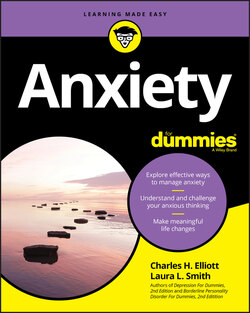Читать книгу Anxiety For Dummies - W. Doyle Gentry, Laura L. Smith - Страница 58
Digging Out the Roots of Anxiety
ОглавлениеAnxiety doesn’t come out of nowhere; rather, it typically stems from some combination of three major contributing factors. The primary villains underlying anxiety are
Genetics: Your biological inheritance
Parenting: The way that you were raised
Anxiety-arousing experiences: Unpredictable, upsetting, or scary events
Studies show that of those people who experience unanticipated traumas or unpredictable events, only a minority end up with severe anxiety. That’s because anxiety stems from a combination of causes. So, someone with resilient genes may experience bad parenting and a series of anxiety-arousing events yet not suffer from serious bouts of anxiety later on. Someone else with less resilient genes could develop serious problems with anxiety. Furthermore, someone with anxiety-prone genes could have a great childhood and relatively few anxiety-arousing events and live a life without significant problems with anxiety.
Everyone experiences some anxiety from time to time. It’s only a problem when anxiety detracts from your overall well-being and quality of life.
Some people seem almost immune to developing anxiety, yet it’s possible that life could deal them a blow that challenges their coping abilities in a way they couldn’t expect. In the story that follows, Liz shows how someone can show resilience for many years yet be tipped over the edge by a series of noxious bullying from her peers.
Liz manages to grow up in a drug war zone without developing terribly distressing symptoms. One night, bullets whiz through her bedroom window, and one pierces her abdomen. She shows surprising resilience during her recovery. Surely, she must have some robust anti-anxiety genes and perhaps some pretty good parents in order to successfully endure such an experience. However, during high school, she is targeted by bullies for her success in her high-school band. Her antagonists post photoshopped, embarrassing pictures of her on social media. She withdraws and starts avoiding friends. Her anxiety causes her to drop out of band, and her grades slip. She just doesn’t have the resources to face this onslaught of stress.
Thus, as Liz’s example illustrates, you can never know for certain the exact cause of anyone’s anxiety. However, if you examine someone’s childhood relationship with her parents, family history, and the various events in her life (such as relationships, accidents, disease, and so on), you can generally come up with good ideas as to why anxiety now causes problems. If you have anxiety, think about which of the causes of anxiety have contributed to your troubles.
What difference does it make where your anxiety comes from? Overcoming anxiety doesn’t absolutely require knowledge of where it originated. The remedies change little whether you were born with anxiety or acquired it much later in your life.
The benefit of identifying the source of your anxiety lies in helping you realize anxiety isn’t something you brought on yourself. Anxiety develops for a number of good, solid reasons, which we elaborate on in the following sections. The blame doesn’t belong with the person who has anxiety.
Guilt and self-blame only sap you of energy. They drain resources and keep your focus away from the effort required for challenging anxiety. By contrast, self-forgiveness and self-acceptance energize and even motivate your efforts (we cover these ideas later in the chapter).
